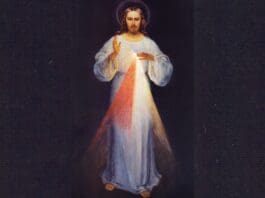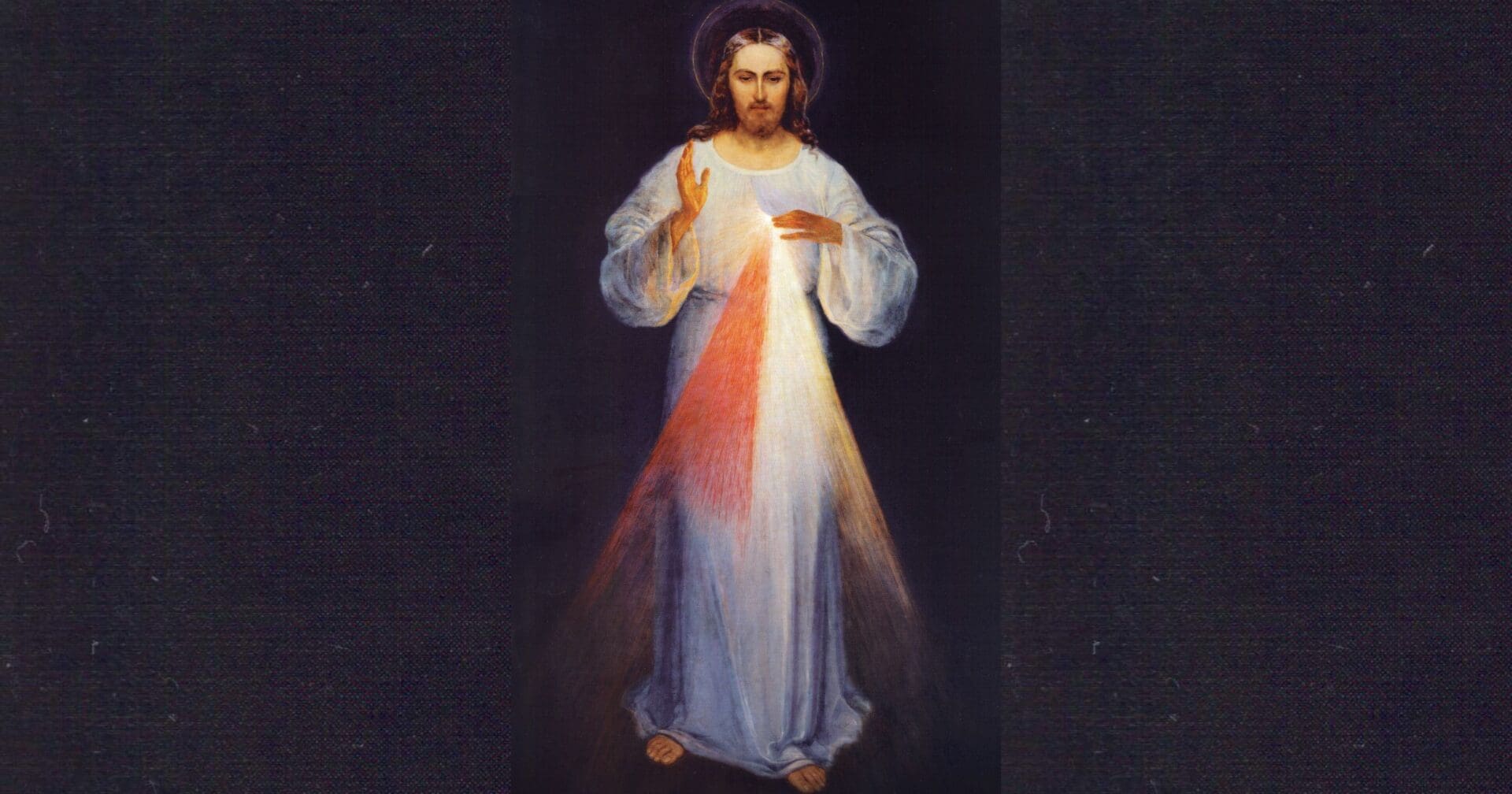
During the course of Jesus’ revelations to Saint Faustina on the Divine Mercy He asked on numerous occasions that a feast day be dedicated to the Divine Mercy and that this feast be celebrated on the Sunday after Easter. The liturgical texts of that day, the 2nd Sunday of Easter, concern the institution of the Sacrament of Penance, the Tribunal of the Divine Mercy, and are thus already suited to the request of Our Lord. This Feast, which had already been granted to the nation of Poland and been celebrated within Vatican City, was granted to the Universal Church by Pope John Paul II on the occasion of the canonization of Sr. Faustina on 30 April 2000.
In a decree dated 23 May 2000, the Congregation for Divine Worship and the Discipline of the Sacraments stated that “throughout the world the Second Sunday of Easter will receive the name Divine Mercy Sunday, a perennial invitation to the Christian world to face, with confidence in divine benevolence, the difficulties and trials that mankind will experience in the years to come.” These papal acts represent the highest endorsement that the Church can give to a private revelation, an act of papal infallibility proclaiming the certain sanctity of the mystic, and the granting of a universal feast, as requested by Our Lord to St. Faustina.
A plenary indulgence (the forgiveness of all temporal punishment resulting from sins that have already been confessed) is granted on the Feast of Divine Mercy if to all the faithful who go to Confession, receive Holy Communion, pray for the intentions of the Holy Father, and “in any church or chapel, in a spirit that is completely detached from the affection for a sin, even a venial sin, take part in the prayers and devotions held in honour of Divine Mercy, or who, in the presence of the Blessed Sacrament exposed or reserved in the tabernacle, recite the Our Father and the Creed, adding a devout prayer to the merciful Lord Jesus (e.g. ‘Merciful Jesus, I trust in you!’).”
A partial indulgence (the remission of some temporal punishment from sin) is granted to the faithful “who, at least with a contrite heart, pray to the merciful Lord Jesus a legitimately approved invocation.”
According to revelations that our Lord made to the saint, he promised to grant complete forgiveness of sins and punishment on the Feast of Mercy, if we should:
1. Celebrate the Feast on the Sunday after Easter;
2. Sincerely repent for all our sins;
3. Place our complete trust in Jesus;
4. Go to Confession, preferably before that Sunday;
5. Receive Holy Communion on the day of the Feast;
6. Venerate the Image of The Divine Mercy;
7. Be merciful to others, through our actions, words, and prayers on their behalf.
According to revelations that our Lord made to the saint, he promised to grant complete forgiveness of sins and punishment on the Feast of Mercy, if we should:
1. Celebrate the Feast on the Sunday after Easter; 2. Sincerely repent for all our sins;3. Place our complete trust in Jesus;4. Go to Confession, preferably before that Sunday;5. Receive Holy Communion on the day of the Feast;6. Venerate the Image of The Divine Mercy;7. Be merciful to others, through our actions, words, and prayers on their behalf.
Concerning the Feast of Mercy Jesus said:
Whoever approaches the Fountain of Life on this day will be granted complete forgiveness of sins and punishment. (Diary 300)
I want the image solemnly blessed on the first Sunday after Easter, and I want it to be venerated publicly so that every soul may know about it. (Diary 341)
This Feast emerged from the very depths of My mercy, and it is confirmed in the vast depths of my tender mercies. (Diary 420)
On one occasion, I heard these words: My daughter, tell the whole world about My Inconceivable mercy. I desire that the Feast of Mercy be a refuge and shelter for all souls, and especially for poor sinners. On that day the very depths of My tender mercy are open. I pour out a whole ocean of graces upon those souls who approach the fount of My mercy. The soul that will go to Confession and receive Holy Communion shall obtain complete forgiveness of sins and punishment. On that day all the divine floodgates through which grace flow are opened. Let no soul fear to draw near to Me, even though its sins be as scarlet. My mercy is so great that no mind, be it of man or of angel, will be able to fathom it throughout all eternity. Everything that exists has come forth from the very depths of My most tender mercy. Every soul in its relation to Me will I contemplate My love and mercy throughout eternity. The Feast of Mercy emerged from My very depths of tenderness. It is My desire that it be solemnly celebrated on the first Sunday after Easter. Mankind will not have peace until it turns to the Fount of My Mercy. (Diary 699)
Yes, the first Sunday after Easter is the Feast of Mercy, but there must also be deeds of mercy, which are to arise out of love for Me. You are to show mercy to our neighbors always and everywhere. You must not shrink from this or try to absolve yourself from it. (Diary 742)
I want to grant complete pardon to the souls that will go to Confession and receive Holy Communion on the Feast of My mercy. (Diary 1109)
As you can see the Lord’s desire for the Feast includes the solemn, public veneration of the Image of Divine Mercy by the Church, as well as personal acts of veneration and mercy. The great promise for the individual soul is that a devotional act of sacramental penance and Communion will obtain for that soul the plenitude of the divine mercy on the Feast.
Photo credit: HistoryIsResearch via Wikimedia Commons
The post Divine Mercy Sunday appeared first on uCatholic.
Daily Reading
Memorial of Saints Joachim and Anne, Parents of the Blessed Virgin Mary
Readings for the Memorial of Saints Joachim and Anne, parents of the Blessed Virgin Mary Reading 1 JER 3:14-17 Return, rebellious children, says the LORD, for I am your Master;…
Daily Meditation
How to Be Good Soil
Click here for daily readings Jesus is the divine Sower who sows the seed of his word in the community of followers that he calls apart from the world. The…




